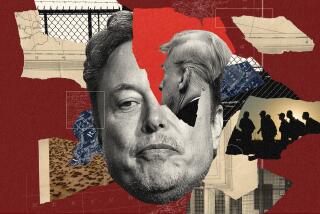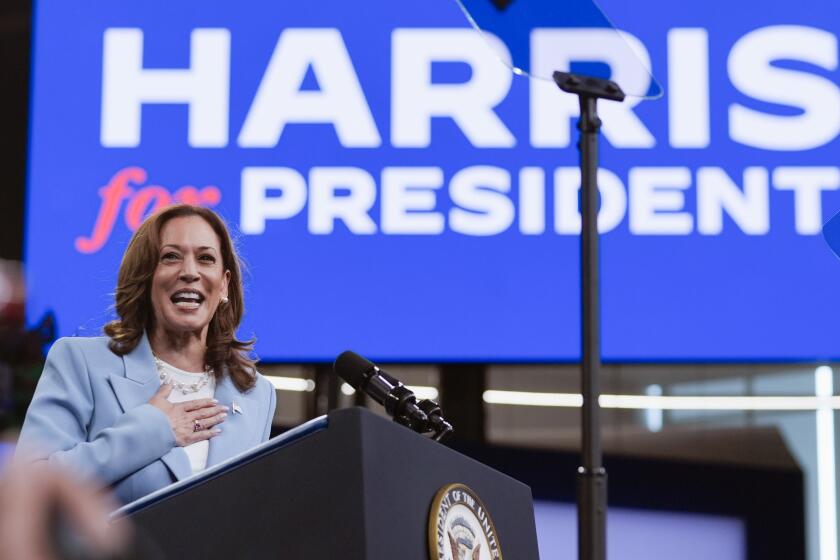McCain doesn’t seal the deal
John McCain came into the third and final presidential debate needing to somehow wrestle the campaign out of Barack Obama’s arms. He did not do it.
There was no single moment that was likely to reverberate in the minds of American voters and change the course of an election that has moved dramatically toward Obama in the last several weeks. But the 90-minute debate was a perfect distillation of McCain’s general election campaign, with all of its inconsistent messages.
He spoke passionately about education and free trade and put Obama on the policy defensive more than in previous debates, but he also spent precious minutes bickering over a domestic radical from the 1960s. He spoke of his desire to reach peaceably across the aisle, while at times exuding what seemed a barely controlled anger, his jaw clenched as he appeared to show disdain for his opponent.
McCain needed to focus with laser-like intensity on middle-class fears over the faltering economy, the universal concern of undecided voters. Initially, he did that. He spoke repeatedly about “Joe the Plumber” -- so repeatedly that by mid-debate Obama too was addressing the man who first surfaced this week at an Obama event to question the candidate about taxes.
But soon the Republican was off-topic and into the swamp of cultural issues that voters have said are not important as their retirement savings dwindle and their homes and livelihoods are threatened.
In a race in which millions of dollars have been spent for the votes of American women, McCain managed in a two-question segment to mock laws protecting a woman’s right to sue for being paid less than a man, and the notion that late-term abortions should be allowed in cases where a mother’s health is threatened.
“That’s the extreme pro-abortion position -- quote, health,” McCain said.
Early instant polls of voters gave the night to Obama.
“There was no knockout punch for McCain, and as far as Obama was concerned, at a time of enormous national anxiety and uncertainty he came across as a voice of deliberate and deliberative reason,” said Mark Petracca, a UC Irvine political scientist who is a Democrat.
Still, McCain had reason to be pleased with parts of the debate. He appeared far more energetic and focused for much of it, and he touched more on the middle class’ travails than he did in the previous two debates. On radio, where his tense demeanor could not be seen, he might have come across more positively, as Richard M. Nixon did in debates with John F. Kennedy.
But on Wednesday, McCain was not helped by television, and particularly not by the networks’ frequent use of the split screen. He said repeatedly that Americans were “angry” and often looked like the angriest of the lot. Obama continued with the visage he has perfected in debates this year, a look of amused detachment.
“The debate was like a Rorschach test,” said Democratic consultant Chris Lehane. “If you like McCain, you probably thought he won, and if you like Obama, you probably thought he won.
“And since there are more Obama supporters than McCain supporters, then it is a good night for Obama.”
McCain set a pre-debate goal of separating himself from George W. Bush, and tried repeatedly to do so. He criticized Treasury Secretary Henry M. Paulson, the administration’s point man in the financial crisis, and pounced on Obama’s suggestion that a McCain presidency would resemble Bush’s.
“Sen. Obama, I am not President Bush,” McCain said, in a powerful moment for him. “If you wanted to run against President Bush, you should have run four years ago. I’m going to give a new direction to this economy in this country.”
Obama, entering the debate with a widening national lead in most recent polls and with momentum in key states, had far less to prove in the debate. He sought to hit the same note of cerebral passion that had marked his earlier debate performances. He, too, returned repeatedly to the difficulties of the middle class, often referring to college as a disappearing dream for some Americans.
With the mien of the front-runner, he could afford to note, as he did several times, issues on which he and McCain agreed. McCain, tasked with tearing down Obama, was forced into a negative posture that risks alienating voters in times of crisis.
In one response on the matter of free trade, McCain opened and closed with gibes at Obama.
“Well, you know, I admire so much Sen. Obama’s eloquence. And you really have to pay attention to words. He said, ‘We will look at offshore drilling.’ Did you get that? Look at,” McCain said.
He closed by calling free trade with Colombia a “no-brainer.”
“Maybe you ought to travel down there and visit them, and maybe you could understand it a lot better,” said McCain.
Much of the pre-debate tension hinged on whether McCain would use the debate to criticize Obama’s connection to 1960s radical William Ayers, now an education professor in Chicago.
McCain has gone after Obama on the Ayers issue in interviews and elliptically at events but did not discuss it in the second debate.
On Wednesday, after moderator Bob Schieffer brought up the nasty tenor of the race, the two candidates launched into a long discourse on the subject in which each blamed the other.
McCain tried to make the case that Obama should not be president because of his past connections to Ayers and the community organizing group ACORN, which Republicans have criticized for voter registration irregularities. But soon he seemed to decide that voters might not care.
“All of the details need to be known about Sen. Obama’s relationship with them and with ACORN, and the American people will make a judgment,” he said.
Then he quickly changed course:
“And my campaign is about getting this economy back on track, about creating jobs, about a brighter future for America. And that’s what my campaign is about, and I’m not going to raise taxes the way Sen. Obama wants to raise taxes in a tough economy. And that’s really what this campaign is going to be about.”
--
More to Read
Get the L.A. Times Politics newsletter
Deeply reported insights into legislation, politics and policy from Sacramento, Washington and beyond. In your inbox three times per week.
You may occasionally receive promotional content from the Los Angeles Times.











